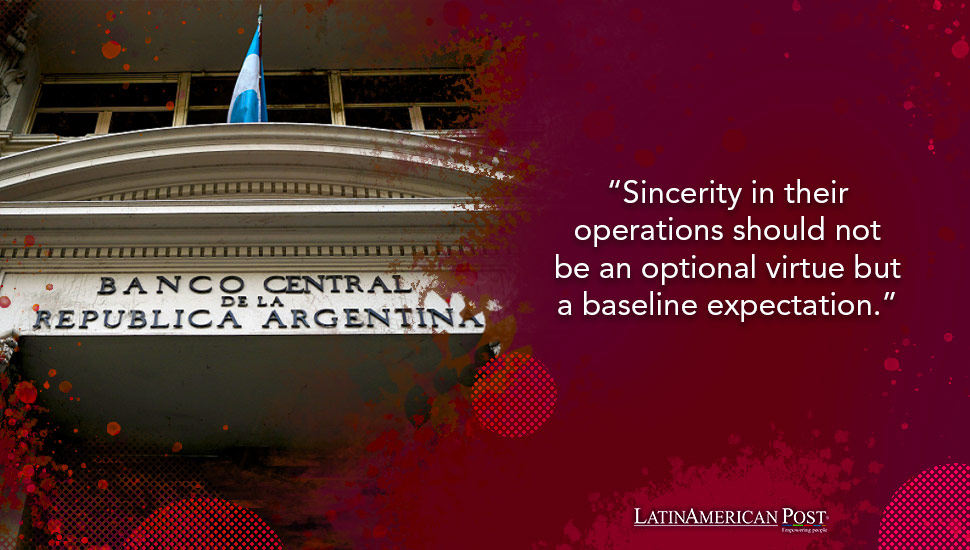Latin American Central Banks Must Uphold Sincerity as a Fundamental Virtue

In a recent move, Argentina’s Central Bank (BCRA) significantly adjusted asset valuations to enhance transparency, underscoring the need for genuine sincerity in central banking for economic stability and public trust.
In the grand theater of global economics, central banks hold a pivotal role, often acting as the guardians of monetary stability and public trust. The recent announcement by the Central Bank of Argentina (BCRA) about a massive $45 billion loss following an asset revaluation is not just a local news item but a stark reminder of the fundamental need for sincerity in central banking. This principle of sincerity, while sounding elementary, is paramount, and its realization can be arduous but transformative, particularly in a region like Latin America with a turbulent financial history.
The Crucial Role of Sincerity in Central Banking
Central banks are expected to be apolitical, transparent, and accountable institutions by design. Their actions directly influence national economies and, by extension, the global economic landscape. Sincerity in their operations should not be an optional virtue but a baseline expectation. Therefore, the BCRA’s recent move to adjust the valuation of assets should be seen not just as a correction but as a commitment to truth, an essential foundation for any institution entrusted with national economic health.
Many Latin American countries have historically grappled with hyperinflation, economic crises, and debt defaults. Financial governance’s lack of transparency and the need for more exacerbates these economic challenges. When central banks operate with opacity, they sow seeds of distrust that bloom into economic instability. Argentina is no stranger to such crises, having faced severe economic downturns over the decades, often driven by or resulting in mistrust in financial institutions.
The Argentine Context
The BCRA’s decision to revise asset valuations and acknowledge significant losses is a painful but necessary step toward restoring credibility. For years, under various administrations, the BCRA had used optimistic valuations for its holdings of government debt, which masked the actual state of its balance sheet and, by extension, the country’s fiscal health. While providing a temporary facade of stability, this practice did little to address the underlying economic vulnerabilities.
President Javier Milei’s administration has inherited a central bank laden with issues—negative international reserves, rampant monetary financing, and explosive central bank debt. The commitment to a zero deficit and the cessation of monetary funding are steps intended to stabilize the economy, reduce inflation, and rebuild trust. However harsh, these measures indicate a more sincere approach to economic management—a stark departure from past practices that often prioritized short-term gains over long-term stability.
The Broader Latin American Perspective
The issue of sincerity in central banking is separate from that in Argentina. Across Latin America, central banks are often at the nexus of economic crises and recovery. Countries like Venezuela and Brazil have also faced significant financial distress, exacerbated by central banking practices that did not always align with the principles of sincerity and transparency. In Venezuela, for instance, the central bank has often been accused of being an instrument of political power rather than a stabilizer of the economy, contributing to hyperinflation and economic collapse.
Conversely, Brazil has seen periods of success attributed to central bank policies that embraced transparency and strict adherence to clear economic principles. Such sincerity in policy formulation and implementation has helped stabilize the Brazilian economy at various points in its history, demonstrating the positive impact of genuine central banking.
Moving Forward: Upholding Sincerity in Economic Governance
For Latin America, the path forward requires a sustained commitment to sincerity in all aspects of economic governance, particularly in central banking. This involves regular, honest assessments of economic realities, transparent communication with the public, and adherence to international financial reporting and accountability standards.
The BCRA’s adoption of International Financial Reporting Standards (IFRS) is a positive step in this direction, aiming to align its practices with global norms. While primarily technical, this move symbolizes a broader commitment to honesty in economic management. It is a crucial step for rebuilding confidence in Argentina’s central bank and its economy.
Also read: Green Economy: How Latin America Could Thrive on Cannabis Legalization
The transformation of central banks in Latin America into bodies exemplifying sincerity is not merely desirable but essential. The process is undoubtedly challenging, involving technical adjustments like those undertaken by the BCRA and a cultural shift towards greater accountability and transparency. As Latin America continues to navigate its complex economic landscape, the sincerity of its central banks will be a cornerstone upon which economic stability and public trust can be rebuilt. This path is fraught with challenges, but it is the only way to ensure that the region’s financial future is built on a foundation of truth rather than illusion.





